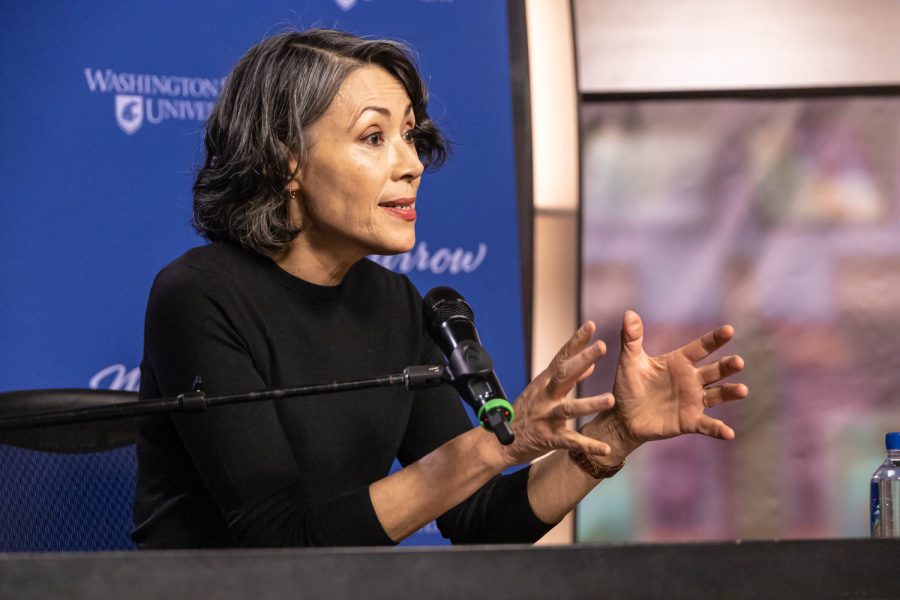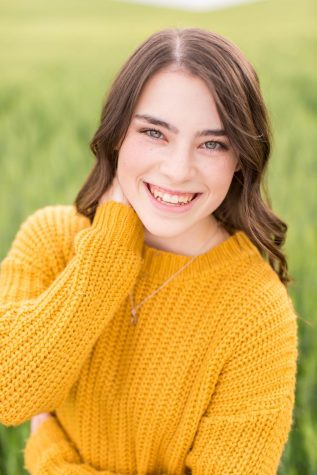Journalist Ann Curry fights to ‘tell stories that matter’
Curry discusses serving the public, ethics in modern journalism during press conference
Edward R. Murrow Lifetime Achievement Award recipient Ann Curry answers questions from WSU students during a press conference on April 4 in Jackson Hall.
April 5, 2022
When Ann Curry was 12 years old, she asked her dad what she should be when she grew up — and received an unexpected reply.
“Well, Ann, whatever you do, do something that is of some service to somebody else,” he said. “Then, and only then, will you know on your last day as you breathe your last breath that it meant that you were here.”
WSU hosted a press conference with Curry, an award-winning journalist, on Monday, encouraging student reporters to ask questions about modern journalism, self-criticism and ethics.
For over 30 years, Curry has reported on humanitarian issues and natural disasters like the 2010 earthquake in Haiti and ethnic cleansing in Darfur, Sudan. Curry earned seven Emmy Awards and will accept the Murrow Lifetime Achievement Award in Journalism on April 5 at the Murrow Symposium.
Curry said she thinks of journalism as a service profession. Reporters may have to rush toward danger or ask difficult questions to help other people become more educated members of democracy and provide information that may even save a life, she said.
Curry said it is an honor to enable people to speak for themselves and have a voice.
“It’s not about you; it’s about them,” Curry said. “It’s about the people you’re recording and the people who are listening. You’re just the one in between.”
Curry had to fight to tell small stories because they were typically not ones that helped producers pay their reporters, she said.
In Los Angeles, she recalled seeing children tease a boy on the playground because his thumb was fused to his hand, and he could not “play ball” with the other children. After this seemingly small incident, Curry said she wanted to recount his family’s struggle of coming from another country — without money or the ability to speak English — to give their son an education, only for other children to tease him.
After Curry’s coverage of the family, doctors surgically separated the child’s thumb from the side of his hand for free.
“Next thing I know, I’m being called into the recovery room, and this kid is sitting up in the bed. He’s looking at me, and he’s in a lot of pain. He raises his hand, he shows me his thumb and in broken English, he thanks me,” she said.
Throughout her career, Curry said she faced criticism from others and herself, but she realized that criticism is a learning experience.
Curry walked into her first newsroom as the only woman of color in the room. She said one reporter told her women had no sense of news judgment and tried to convince her to leave her job.
Providing representation for younger reporters was a lot of pressure, but Curry said she knew she had to “make space” for people who would follow in her footsteps.
Curry said a new wave of “goodness in journalism” lies within the next generation of reporters. In a period of new technology, there are more opportunities to uncover the truth and connect with others on a global scale, she said.
Curry said powerful forces are using technology to manipulate the truth, but reporters should continue to be trustworthy and verify information.
In addition to facing a “rollercoaster” of evolving technology, Curry said she faced ethical dilemmas throughout her career.
When she covered the 2006 Lebanon War, Curry and her fellow reporters interviewed an elderly woman in between waves of bombings. Surrounded by collapsed buildings, the woman told them she came back for her heart medication because she could not afford any more.
As the next wave of bombings was about to begin, reporters fled. Curry had to decide whether to leave the woman or put her team at risk. She refused to leave the woman’s side, but her producer was not pleased. Curry said she thought about it for years afterward.
“I did jeopardize my team. I did jeopardize my security guy. But I also got her out,” she said.
At the end of the press conference, Curry said reporters who study journalism because they want to become famous will most likely be disappointed. Reporters must work hard to fight for stories that matter.
“It has been an enormous privilege to see the beauty and the resilience of humanity under the worst of circumstances and the generosity that people have toward each other when they themselves are on their knees. I would not give that up for anything,” she said.











